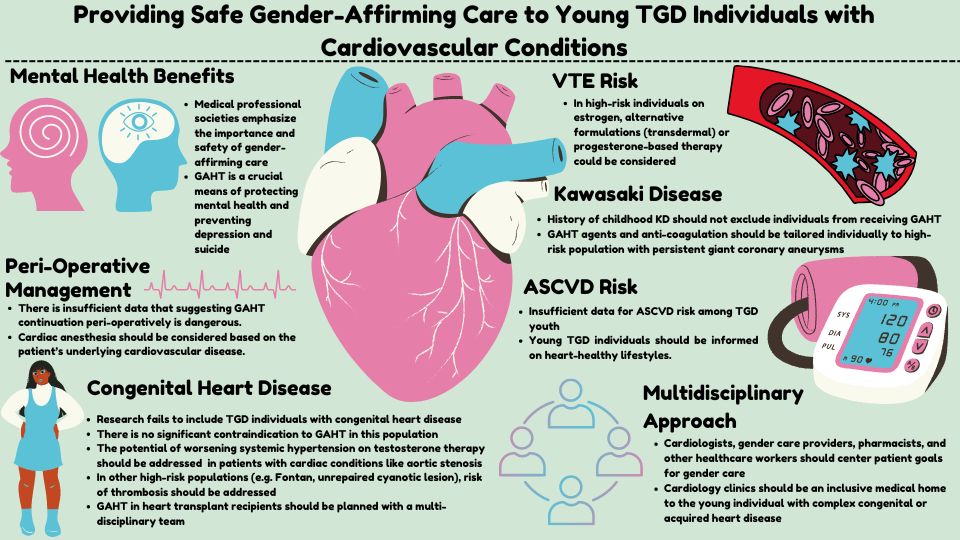Endocrinology 2
Session: Endocrinology 2
310 - Considerations for Gender Affirming Care and Hormone Therapy in Adolescents and Young Adults with Congenital and Acquired Heart Disease
Sunday, April 27, 2025
8:30am - 10:45am HST
Publication Number: 310.4118
Thomas J. Agostini, University of Washington School of Medicine, Seattle, WA, United States; Eyal Sagiv, Seattle Children's, Seattle, WA, United States; Juanita Hodax, Seattle Children's, Seattle, WA, United States; Andy Pistner, University of Washington School of Medicine, Seattle, WA, United States; Jason Deen, University of Washington School of Medicine, Seattle, WA, United States

Thomas J. Agostini, MD (they/them/theirs)
Resident
University of Washington School of Medicine
Seattle, Washington, United States
Presenting Author(s)
Background: Gender-affirming care is a multi-faceted healthcare service that provides life-changing support to transgender and gender diverse (TGD) individuals. As more adolescents continue to identify as TGD, it is critically important for all healthcare providers to have familiarity with gender-affirming care. Medical options for gender-affirming care can include surgical and hormonal options, which can help promote physical characteristics for TGD people to match their gender identity. All major medical organizations stand in support of gender-affirming hormone therapy (GAHT) for TGD youth because of well-described positive outcomes in mental health. While cardiovascular disease (CVD) is described in TGD adults, CVD in TGD youth is largely understudied. Cardiologists should be informed on how to participate and ensure safe delivery of gender care to adolescent and young adult TGD patients.
Objective: This review aims to examine the existing literature related to GAHT and CVD for adolescents and young adults.
Design/Methods: We performed a systematic literature review to create a guiding summary and expert opinion for pediatric and adult congenital cardiologists, focusing on the cardiovascular effects of gender affirming hormone therapy (GAHT). 89 articles were initially screened by title and abstracts, and 68 made it into the review. Medical society guidelines and landmark studies in exogenous hormone therapy were also included by authors.
Results: TGD individuals are underrepresented and underreported in cardiovascular research. Data on the cardiovascular safety of exogenous hormone therapy is limited to older adults and cannot be directly translated to outcomes in youth and young adults. There is no evidence to preclude individuals with cardiovascular disease from receiving GAHT. GAHT was not shown to increase morbidity in cardiac events, vascular disease, heart failure, arrhythmias, perioperative or post-transplant care. Specific risks, including thromboembolic disease with oral estradiol and atherosclerosis or systemic hypertension with testosterone, could be reviewed and mitigated for high-risk individuals with an individualized care plan.
Conclusion(s): We find no contraindications to providing GAHT to TGD individuals with congenital or acquired heart disease. Cardiologists should collaborate with a multidisciplinary care team on considerations for certain groups with high-risk cardiovascular conditions. Clinical research trials should emphasize inclusion of TGD individuals as gender-affirming care continues to advance.
Providing GAHT Safely to Adolescents with Cardiovascular Conditions

Providing GAHT Safely to Adolescents with Cardiovascular Conditions


